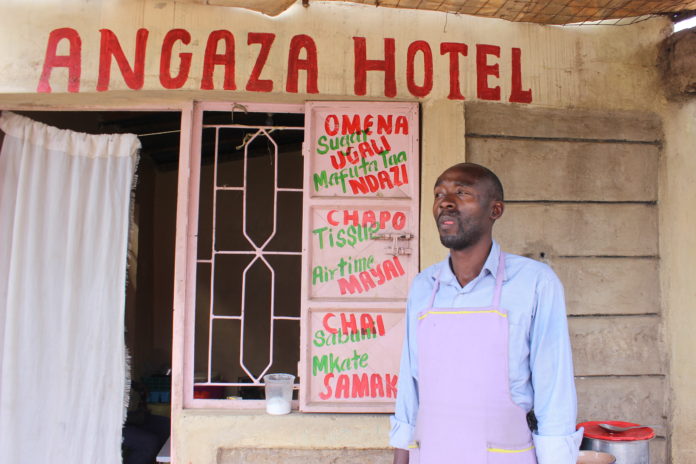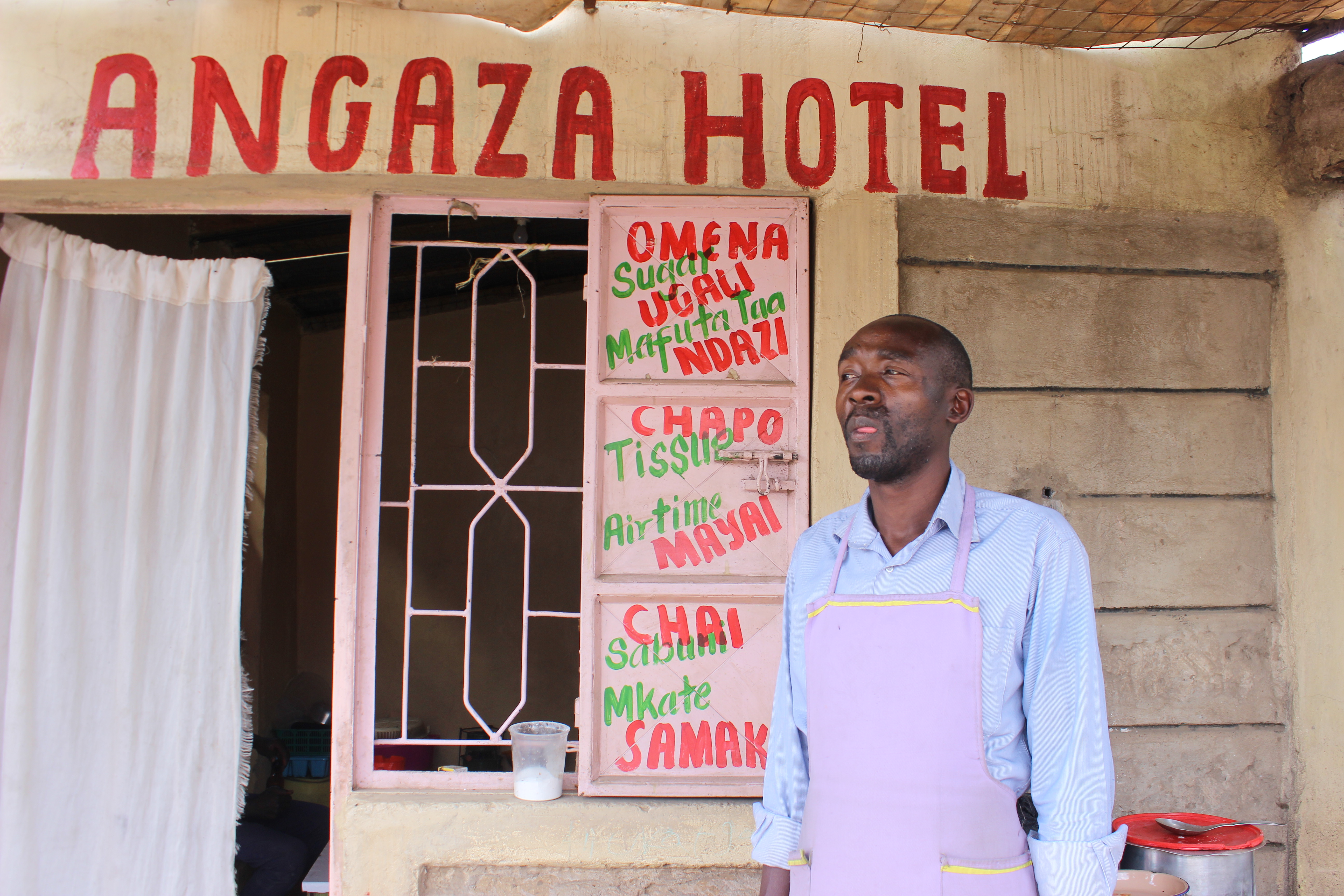By Lilian Museka
David Obusi 40, is a business man dealing with fish supply. His customers range from individuals to retailers who in turn resale it in the market areas. He recently decided to expand by venturing into a small hotel in Soweto, Kayole estate in Nairobi County, Kenya.
However, he did not have the capital to buy all the items required for his startup. In Kenya, small businesses have become a wellspring for many. However acquiring loans for startups or expansions become a problem as many lenders shy away citing lack of customer base, lack of experience or management skills.
Moses therefore borrowed from Mshwari, Mpesa product which is a partnership between Safaricom and Commercial Bank of Africa that enables one to save and borrow money.
“I borrowed Ksh 10,000 as my loan limit is Ksh. 15,000. I, however, realized that the amount I borrowed was not enough to buy all the items I required. I tried to find out whether I could borrow a second loan to my maximum limit. I was told I had to repay the first amount before I could borrow again. I got frustrated as I really needed money to start off my business.” He says.
Obusi borrowed from a friend the Ksh 5,000 who also advised him to approach Okolea International, a financial institution with an app that provides Kenyans with an opportunity to borrow three times simultaneously.
Obusi at his Hotel
“You can now borrow up to three times but within your assigned limit without paying your first loan, a feature meant to encourage customers to only borrow what they need at a time.” Says Peter Muraya, Chief Executive at Okolea International.
Through the app, available on google play, one can borrow responsibly following the developer’s major upgrade allowing users to have three different loans with different rates and duration.
The interest bands are five percent for those who pay within two days, eight percents for one-week payments 11 percent for two weeks, 13 percent for three weeks and 15 percent for one month.
Okolea is also one of the first digital players in Kenya to embrace the duplum rule, ensuring interest for late payments does not exceed the principal borrowed.
Amendment No. 9 of 2006 of the Kenya Banking act introduced the duplum rule into Kenyan legislation. The rule provides that with respect to non-performing loans, contractual interest should not exceed the principal amount. However, expenses incurred in the recovery of any amounts owed by the debtor may be recovered.
“We are the first mobile lenders to work within the rule. This is because any loan defaulted attracts a maximum interest of Ksh 1,000, unlike our competitors whose charges keep rising,” says Muraya.
The digital lending company which began two years back has more than 250,000 registered users for the loaning facility and serving over 100,000 clientele in terms of day to day loans offer.

“Once you download the app, you register and Okolea International will appraise your account to determine the loan amount you qualify for and the limit. You will have to allow us to access your Mpesaand your Credit Reference Bureau ( CRB) report to enable us to determine your eligibility,” Says Muraya.
Over 6.5 million Kenyans currently use the digital borrowing platforms. This was established through a recent study. The joint survey conducted by a non-state financial inclusion agency-FSD-Kenya, Central Bank of Kenya, Kenya National Bureau of Statistics and Consultative Group also revealed that borrowing was done majorly for subsistence.
These digital platforms are provided by Safaricom’s Mshwari, KCB Mpesa, Branch, Saida, Zidisha, Tala Instant mobile loans, Haraka, Okash, Pesa Pata, PesanaPesa, Okolea International among others.
Borrowing apart from being done to meet daily needs, is also done to replenish stocks in small businesses. Surprisingly, the detailed report shows that up to 800,000 Kenyans take multiple loans to offset the already existing ones.
The report titled, “The Digital Credit Revolution in Kenya: An Assessment of Market Demand, 5 Years On,” shows that close to one million borrowers did not understand interest rates applied by the online digital loan platforms.
The study proposes the development of tools to track over-indebtedness whose adverse effects were hurting most Kenyans and having them blacklisted.
It calls for further research to empower Kenyans on the proper use of loans to ensure they are not stuck in debts.
“This is where our main focus is. We are in the business of helping people, not exploiting them. We allow them to only borrow what they can manage,” says Muraya, adding that “If your loan limit is Ksh, 12,000 and you only need Ksh. 4,000, you will have it. However, if you realize you need more money, you can borrow another Ksh 4,000 and again the remaining amount simultaneously without having to repay the first amount first.”
Each loan matures separately thereby allowing the customer ease of payment. This helps us in ensuring responsible lending to our clients without overburdening them. Again if you borrow Ksh. 1000 for a month, you will be charged 15% interest and a processing fee of Ksh.20
Loans range from Ksh. 500 to a maximum of Ksh 140,000. The customers are nationwide but bigger numbers are concentrated in bigger cities like Nairobi, Mombasa, and Kisumu. Others in include Kakamega, Busia, Eldoret, and Nakuru, among others
Okolea International has also lowered its interest rates to a minimum 5% and a maximum of 15% from its previous high of 20%.
“Okolea recognizes that having rates fixed per month is detrimental to the welfare of the customer since some customers pay before the month ends. This led to the introduction of interest bands which depends on time repaid passing benefits to those who pay early,” Muraya adds.
Okolea International has three retail offices; in Kiambu, Kitengela, Nairobi Central Business District and the main office in Ruaka. “Customers can walk in any of the retail officers for support in case they face any challenge. In the next two to three years, we are looking at having offices in every county to serve all our clients,” says Muraya
However, Muraya admits that the lending institutions face the greatest challenging of default in payments by clients. “Default is real in all institutions. We are however working around the clock to ensure that we only serve customers who are honest and have the capability to pay,” he concludes.















